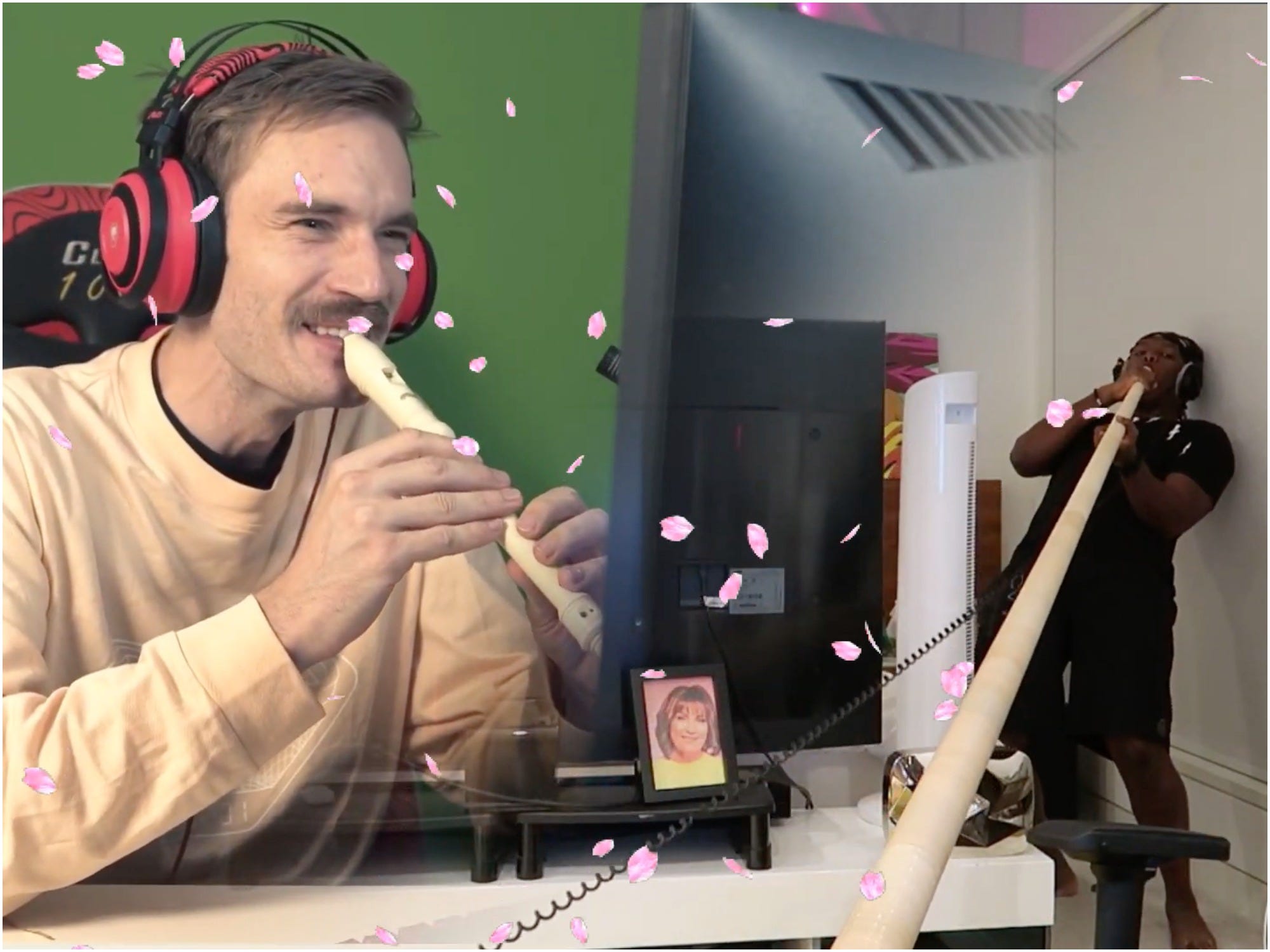
PewDiePie / YouTube
- KSI cohosted PewDiePie’s Meme Review this week, and the two YouTubers serenaded their subscribers with Celine Dion’s “My Heart Will Go On” at the end.
- The pair played the song on a recorder and an alpine horn for a few seconds, but it was pretty much unrecognizable from the original track.
- However, the terrible cover was enough for a company to claim the video and all its revenue, PewDiePie said.
- PewDiePie said he appealed the claim, which was subsequently rejected. “I just thought it was bulls—, I don’t even know,” he said in an Instagram story.
- Visit Insider’s homepage for more stories.
KSI appeared on PewDiePie’s YouTube channel to cohost his Meme Review segment, and the pair serenaded their subscribers with a performance of Celine Dion’s “My Heart Will Go On” at the end, played on a recorder and alpine horn.
Despite their best efforts, the song was hardly recognizable — but that didn’t stop a company making a copyright claim over the video.
PewDiePie, whose real name is Felix Kjellberg, posted an Instagram story on Wednesday where he showed that a company was claiming the revenue for the whole video as their own for the cover he and KSI played for a few seconds at the end.
“It’s too similar isn’t it,” Kjellberg said sarcastically while showing the part of the video that was apparently a violation.
“So I appealed it, obviously, because it’s bulls—, like why? And they rejected it. This is actually infringing on copyright according to this company.”
—Sara (@blendyourglow) November 25, 2020
He said that the unnamed company is now receiving all the money made from the 30-minute video.
"So all the revenue now goes to this company for the entire video," he said. "I just thought it was bulls---, I don't even know."
Creators often object to YouTube's copyright system
According to YouTube's copyright rules, "if you upload a video that contains copyright-protected material, you could end up with a Content ID claim issued by the party who owns the music, movies, TV shows, video games, or other copyright-protected material."
"A Content ID claim may result in a takedown or lost revenue depending on the actions specified by the copyright owner (but you can dispute a claim that you believe is wrong)," the website reads. "We believe that it's important for YouTube to remain a platform that inspires vibrant creativity and protects creative rights."
YouTube's copyright system uses a program called Content ID, which scans videos and flags any to creators where it sees their work being copied. The creator then decides whether to make a claim depending on whether the video falls under the fair use copyright exception or not.
Companies or individuals with YouTube accounts can also make claims manually for anything Content ID misses.
Creators often speak about how the system can be exploited, and note that YouTube automatically sides with the claimant and assumes the breach is real.
One YouTuber told Insider in a previous article that Warner Chappell kept copyright claiming her videos because she hummed a song for a few seconds.
"I reached out to YouTube about it and they said they'd look into it and I never heard anything again," she said.
"They bend over backwards to keep big advertisers and companies happy. They probably don't want to even risk taking the fall for copyright lawsuits so they let the rights holders paint with a broad brush that leads to a ton of copyright abuse."
PewDiePie's fans think he is treated more harshly
Kjellberg, who has 107 million subscribers, has the second biggest channel in the world after the Indian music label T-Series. Some of Kjellberg's fans have been discussing the copyright issue on social media, commenting on how they believe YouTube treats its biggest star more harshly than other creators.
"PewDiePie makes a video covering my heart will go on, barely sounds like it, and he gets copyrighted," one fan tweeted. "I did a video with the same audio and everything is OK, @YouTube proves they really don't know what they're doing, it's just unfair."
In October, a glitch affected Kjellberg's channel, which resulted in his videos and profile not appearing in YouTube's search.
This led to speculation online that Kjellberg had been "shadowbanned" — when a user's content is blocked to viewers without their knowledge. YouTube responded with a statement saying it was an error, and the apparent bug was fixed after a day.
"I didn't think they shadowbanned me, I just assumed it was a glitch," Kjellberg said in a video a few days later. "But it begs the question, how does that happen? How did it happen? It didn't happen to anyone else. I asked around."
Insider has reached out to Kjellberg and YouTube for comment.

